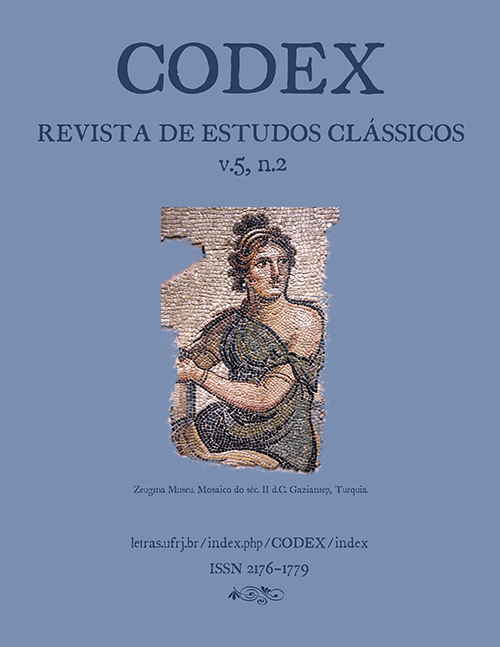The Elegy in the Aeneid Book IV
DOI:
https://doi.org/10.25187/codex.v5i2.13971Keywords:
Aeneid, Book IV, Virgil, Epic, Elegy, LoveAbstract
In Aeneid's book IV, Virgil makes use of elegiac topics while narrating Dido and Aeneas' ill-fated love, inserting these topics into the epic genre. Some key characteristics of elegiac lover, such as the furor by which he is taken when injured by Cupid's dart; lover's idleness; the mala fama that emerges from the love affair; and, lastly, the misera condition in which the lover is thrown to, always followed by a lament; all these has shown to be present in Aeneid's book IV. So, in addition to evincing how epic genre, without losing its formal rigour, subsume other genres, in this case the elegiac one, this article observes how this procedure takes part in both Vergil's intra-narrative and extra-narrative purpose when composing Aeneid. In the first case, if we bear in mind that books I to VI are concerned with the construction of Aeneas' heroic ἦθος, the hero's denial in staying together with the queen confirms, once again, his destiny, which is Rome's foundation, that is conventionally of an epic hero -- and not of an elegiac lover. As for the second one, it is first important to be aware of Vergil's aim when composing Aeneid, which is to insert Rome's history into a myth, which is the elegiac poem itself. Therefore, Dido's abandonment and her following imprecation in verses 590-640 are used by the poet to justify, even if ironically, Carthaginians' rivalry and violence against Romans throughout the Punic Wars, putting them as the result of a woman's love frustration.
References
DUQUE, G. (2015). Do pé à letra: Os amores de Ovídio em Tradução Poética. 2015. Dissertação do Programa de Pós-Graduação em Letras. Vitória: Universidade Federal do Espírito Santo.
HUTCHINSON, G. (2013). “Genre and Super-Genre” in Generic Interfaces in Latin Literature. Berlin, Boston: De Gruyter: 19-34. Retrieved 23 Sep. 2017, https://doi.org/10.1515/9783110303698.19.
MARTINS, P. (2001). Eneias se reconhece. Letras Clássicas, 5: 143-157. doi:http://dx.doi.org/10.11606/issn.2358-3150.v0i5p143-157
MARTINS, P. (2013). Pictura Loquens, Poesis Tacens: limites da representação. Tese de Livre Docência, Faculdade de Filosofia, Letras e Ciências Humanas, Universidade de São Paulo, São Paulo. Recuperado em 2017-09-23, de http://www.teses.usp.br/teses/disponiveis/livredocencia/8/tde-19112015-181808/
MARTINS, P. (2015). O jogo elegíaco: fronteiras entre a cultura material ou intelectual e a ficção poética.. Nuntius Antiquus, 11(1), 137-172. Recuperado de http://www.periodicos.letras.ufmg.br/index.php/nuntius_antiquus/article/view/8539
MARTINS, P. (2017a). “Propércio Redivivo” in Livro: Revista do Núcleo de Estudos do Livro e da Edição (NELE), v. 6: 426-41.
MARTINS, P. (2017b). “Ekphrasis, Digression and Elegy: The Propertius' Second Book” in Classica - Revista Brasileira de Estudos Clássicos, 30.1: 175-192. doi:http://dx.doi.org/10.24277/classica.v30i1.437.
MARTINS, P. (2017c). “Propércio Recidivo” in Translatio, v. 14. (forthcoming).
MARTINS, P. (2017d). Augusto como Mercúrio enfim. Revista de História,176: 01-43.doi:http://dx.doi.org/10.11606/issn.2316-9141.rh.2017.116333
MARTINS, P. (2017e). Tum longas condimus Iliadas: a Helena de Propércio. Archai no21, sep.-dec., p. 159-206
DOI: https://doi.org/10.14195/1984-249X_21_5
OLIVA NETO, J. A. (2013). Dos Gêneros da Poesia Antiga e Sua Tradução em Português. 2013. Tese de Livre Docência -- Universidade de São Paulo, São Paulo.
OLIVA NETO, J. A. (2013). “Introdução” in Eneida. Tradução de Carlos Alberto Nunes; organização, apresentação e notas de João Angelo Oliva Neto. São Paulo: Editora 34.
SAYLOR, C. (1986). “Some Stock Characteristics of the Roman Lover in Vergil, Aeneid IV” in Vergilius. Vol. 32: 73-7.
VIRGÍLIO (2014). Eneida. Tradução de Carlos Alberto Nunes; organização, apresentação e notas de João Angelo Oliva Neto. São Paulo: Editora 34, 2014.
Downloads
Published
How to Cite
Issue
Section
License
This work is licensed under a Creative Commons Attribution-NonCommercial 4.0 International License.










